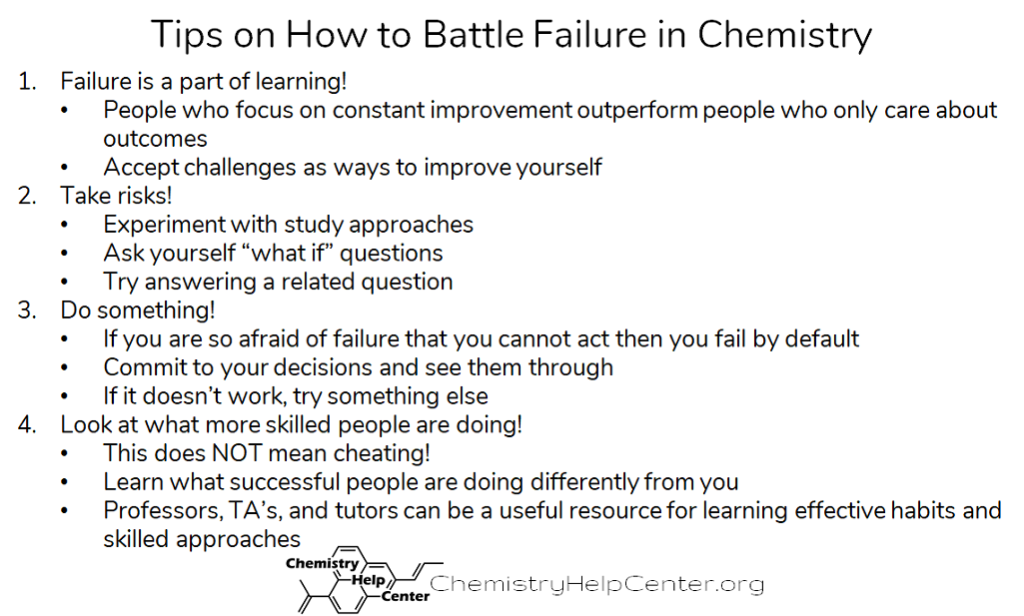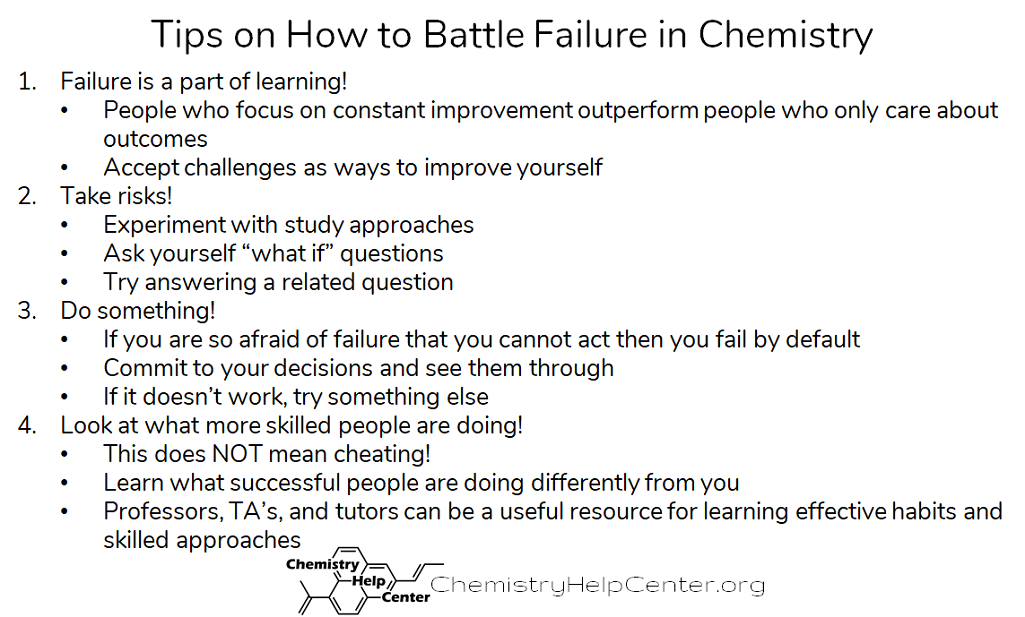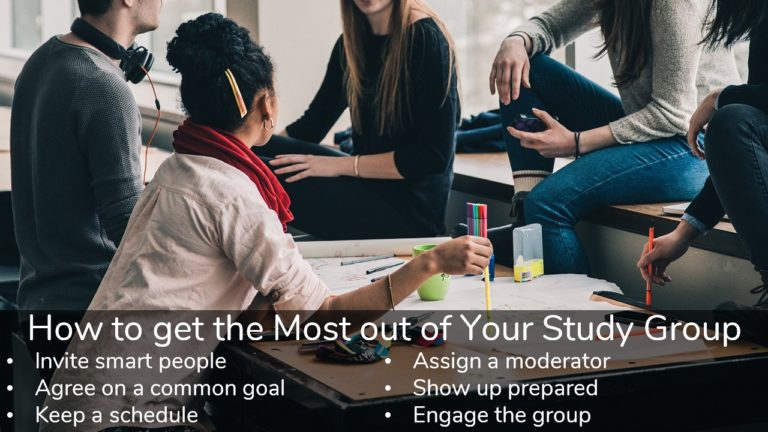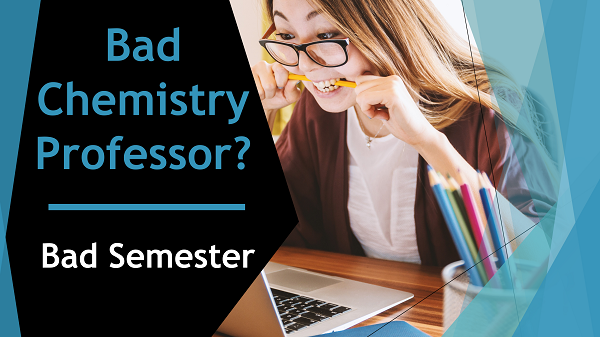How to Succeed in Chemistry Class: An Incremental Gain Approach
Success in a chemistry class is a particularly hard topic to discuss. It is a multifaceted and difficult topic that is deeply rooted in the overall cognitive theory and the idea of intelligence. Luckily, the cognitive science offers some guidance on how to succeed in chemistry. Let me elaborate.
There will be a moment in your course, when you’ll fail. Failing is unavoidable. It is a part of learning. It is what going to help you grow and go to the next level and finally succeed in your chemistry class. Thus, it will all boil down to how you deal with the failure.
There are two major schools of thought that look differently on the intelligence. One looks at intelligence as a fixed quantity. In other words, it’s an argument about the Nature vs Nurture approach to the intelligence. The entity theory of intelligence claims, in short, that we are born with a certain “quantity” of intelligence and nothing we do will significantly change it.
The second theory is the incremental theory. The Incremental theory claims that the intelligence is a “malleable” asset that can be changed. This change can be both positive and negative, meaning that we can gain or lose intelligence with time.
The major difference is how the two theories look at the assessment (self or by others) and how that affects our actions. The entity theory is focused on the performance. Namely, it is the end-goal that matters, not the journey. While the incremental theory focuses on the journey itself rather than the end-goal. The incremental theory proclaims that the effort is what counts.
How the two theories treat failure?
Chemistry is one the most difficult subject in a college curriculum. It incorporates the knowledge of math, physics, aspects of biology, and other natural sciences. This means that to succeed in chemistry you’ll need a diverse set of problem-solving skills. And that skill set is going to be in a constant flux. Your collection of approaches will be constantly changing and evolving to accommodate the new more involved and challenging problems. One strategy that might have worked for one type of a problem won’t be sufficient to solve another type. Or one approach to studying topic filled with nomenclature won’t cut it when you need to comprehend a module on bonding, etc.
Failure is a part of learning!
- People who focus on constant improvement outperform people who only care about the outcomes
- Accept challenges and ways to improve yourself
So, since the failure is unavoidable, how do we deal with that? The two theories of intelligence tell us that people differ in their approach to failure based on what they choose to focus. The entity theory suggests that people overemphasize the performance. When they face the problems that seems to be too difficult to solve they go into a “helpless” mode. The characteristics of the “helpless mode” are the:
- Avoidance of the challenge,
- Deterioration of performance when challenged, and
- Blaming personal inadequacies for the failure (deficient intelligence, poor memory, insufficient problem-solving skills, etc.)
In her experiments with children, a cognitive psychologist Carol Dweck showed that 2/3 of the performance-oriented students tend to experience lower outcome. So, those students who mainly focus on getting the correct answer, fail more when facing a challenging question. The researchers were interested in seeing how students would approach a problem that was designed to be overly challenging: an “impossible problem.” Curiously enough, but over 60% of those students also reverted to inefficient problem-solving skills when facing an “impossible” problem. Meaning, that they knew that their approach is flawed, yet they would still use it despite no improvement in results. Can you remember when you had a challenging chemistry homework question and didn’t know how to solve it? And, probably, you’ve decided to go over your notes or a textbook one more time. Since you “had to get the answer” you were more likely to revert to something that you’ve done before, even though it was not effective. Sounds familiar?
The mastery-oriented students, however, see the “impossible” problem as a challenge to overcome. Most mastery-oriented students in Dweck’s experiments didn’t even think they were failing. They believed that they just needed to put more effort into the problem. Or, perhaps, they didn’t focus enough, so they need to pay more attention to details. So, instead of going into a “helpless mode” they tried to invent new ways to solve the problems. This approach resulted in over 80% of students retaining the problem-solving skills. Also, over 25% of the students invented new creative strategies to solve the problem. That’s like that time when instead of re-reading your textbook again, you decided to rephrase the question. Or, perhaps you went to your roommate who took the course last semester and asked her for some pointers. Or you went to your professor’s office hours to ask them for help.
Take risks!
- Experiments with study approaches
- Ask yourself “what if” questions
- Try answering a related question
How is it relevant to success in chemistry?
Success in a chemistry course often means the high grade at the end or a high score on the exam. However, overemphasizing the outcome leads, as the research suggests, to ignoring, avoiding, and abandoning the potentially valuable learning opportunities that come from creative approach to problems. When you solely think about the score on the exam, you will subconsciously try to avoid the difficult or extraordinary problems and keep on walking the known path in your studying. This is detrimental to your success in chemistry!
Do Something!
- If you are so afraid of failure that you cannot act, then you fail by default
- Commit to your decisions and see them through
- If that doesn’t work, try something else
Chemistry is a very effort- and practice-intensive subject. And putting a lot of effort into studying something that doesn’t show results instantly is hard. So, it is not uncommon to put a lot of effort into studying chemistry and see little improvement. This is, however, because you’re only focusing on the performance, aka the grade. When studying a hard subject such as chemistry, it is very important to recognize the incremental gains throughout the process. Otherwise, you’re setting yourself up for the “helpless mode” for the rest of the course.
The important thing to remember here is that the large differences in performance is, usually, a result of a gradual gains over time. This means that effort counts but only when the effort is combined with persistence.
But I already spend so much time studying and still can’t seem to succeed in my chemistry class!
I’m a big proponent of studying smarter rather than studying harder. We have a separate post on the active study strategies, so check it out. There’s one thing, however, that I do want to add to the topic.
Virtually nobody intentionally does the “wrong thing” or using the “wrong approach” when studying chemistry. We all act or react based on the deeply embedded psychological motivations and payoffs that have been reinforced in us over time. If rote memorization worked before, I’m more likely to revert to this technique this time. If pulling an all-nighter before the test helped me to score and “A” last time, I’m going to pull it this time too. If just reading the book or notes landed me with an “A” before, why reinventing the wheel? This way, the “wrong study approaches” are reinforced in us by getting what we want: an “A” on the exam. And since we have tendency to overemphasize the result (aka, the “A” on the exam), we’re less likely to notice the self-destructing effect of such approaches.
Look at what more skilled people are doing!
- This does NOT mean cheating
- Learn what successful people are doing differently from you
- Go to your professor’s or TA’s office hours
- Hire a tutor
And as always, if you need any help or pointers on how to succeed in your chemistry class, just send us a message!
In Summary







